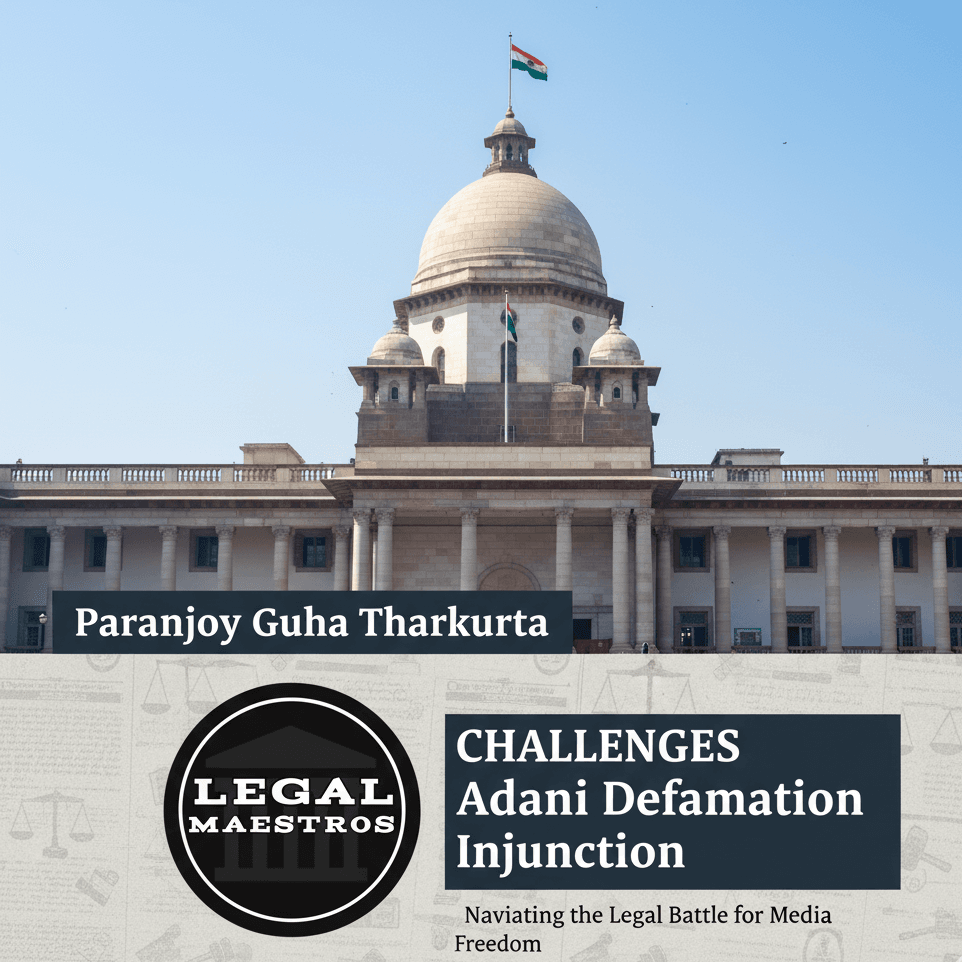
Paranjoy Guha Thakurta Challenges Adani Defamation Injunction
Paranjoy Guha Thakurta, a long-time veteran journalist, is once again caught in the middle of a legal tempest, over a defamation injunction that was brought against the journalist by Adani Enterprises Ltd. The case is a highly controversial area of the Indian media life, which also reveals the conflict between corporate interests and the right of press freedom. This is not the first time that Guha Thakurta is in a lawsuit against the Adani Group, as he has been sued in the past by the group on his comprehensive and critical coverage of the group. The issue that is currently under debate is that of a gag order in the Delhi court that prevents his publication of material considered defamatory to the company and other journalists as well.
. An ex parte order can be defined as an order that has been given without the hearing of all the parties involved in this case the journalists themselves. The court ordered Guha Thakurta and others to take down some of its articles and social media posts, and not to publish any more unverified, unsubstantiated and ex-facie defamatory reports regarding Adani Enterprises. This injunction was in reaction to a libel suit that Adani Enterprises had initiated claiming that the reports were harmful to their image, and hence, the loss of investor confidence and affecting their business negatively.
The Journalist’s Challenge to the Injunction
Journists such as Paranjoy Guha Thakurta are now appealing to the injunction issued by the court on the ground that the injunction is too broad and a limitation on their free speech to report. Guha Thakurta has in his appeal said that the court has not indicated what content was determined as defamatory so the order was a blanket ban on his reporting. He insists that his journalism is factual and it is in the interest of the people. He is determined to take on the defamation law suits which he deems to be an effort to curb negative journalism.
For any queries or to publish an article or post or advertisement on our platform, do call at +91 6377460764 or email us at contact@legalmaestros.com.
The journalists have appealed arguing that they had been reporting about Gautam Adani or the Adani Group, and not about the legal entity Adani Enterprises Ltd. According to them, this is the major difference that was not acknowledged by the court. Moreover, the lawyers of the journalists claim that they should not have granted an interim injunction without having a hearing, considering that their profession concerns the interests of people. According to them, the order of the court violates their basic right of freedom of speech and expression.
The Government’s Involvement and Takedown Notices
This has been further fueled by the ministry of information and broadcasting (MIB) involvement. Demonstrating the order of the court, the MIB has instructed different digital news producers, leading media houses, and independent journalists to remove the content concerning the Adani Group. The directive has led to deletion of dozens of video clips on YouTube and Instagram posts. This move by the MIB has cast doubt on the role played by the government in implementing a civil court order and the question on the minds of critics is why the ministry is actively involved in a personal legal battle.
The MIB release has been distributed to a vast number of reporters and media houses most of which were not even mentioned as defendants in the initial defamation case. This has caused the accusation that the takedown order is a type of censorship. Included in the flagged content are not only investigative reporting, but also satirical pieces and accidental references, another issue that contributes to the controversy of the scale and effects of such injunctions on news and artistic freedom of expression.
For any queries or to publish an article or post or advertisement on our platform, do call at +91 6377460764 or email us at contact@legalmaestros.com.
Broader Implications for Media Freedom in India
The court case between Paranjoy Guha Thakurta and Adani Group is regarded by most people as an indicator of the state of media freedom in India. A trend of using the defamation suits to sue journalists by heavy corporations is on the rise and this case is a classic example of what challenges the journalists who report on large companies to go through. Critics have said that the purpose of such suits commonly known as Strategic Lawsuits Against Public Participation or SLAPs has no aim of ever being won in court but to attempt to intimidate journalists so that they can empty their wallets and stomachs of their money.
The decision in this case may create a major precedent in the future of the investigative journalism in the country. It will decide whether the journalists will be able to further keep the powerful in check without having to face the threat of prosecution and injunction that will act as a gagging mechanism. The situation in the case demonstrates the thin line between safeguarding corporate reputations and the right to information of the population.





![Research Assistantship @ Sahibnoor Singh Sindhu, [Remote; Stipend of Rs. 7.5k; Dec 2025 & Jan 2026]: Apply by Nov 14, 2025!](https://legalmaestros.com/wp-content/uploads/2025/11/Gemini_Generated_Image_s0k4u6s0k4u6s0k4-768x707.png)
![Karanjawala & Co Hiring Freshers for Legal Counsel [Immediate Joining; Full Time Position in Delhi]: Apply Now!](https://legalmaestros.com/wp-content/uploads/2025/11/Gemini_Generated_Image_52f8mg52f8mg52f8-768x711.png)